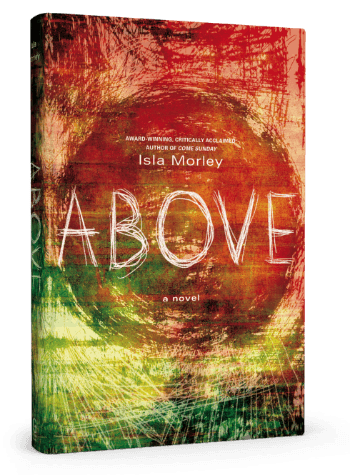I am a loyal reader. When I find an author whose book I like, I want to read the rest of their books. So when I had the opportunity to review Isla Morley’s new novel Above, I said “yes” without even asking what it was about.
Her debut novel Come Sunday takes readers into a difficult moment of motherhood (losing a child) and to unique settings (Hawaii and South Africa) and I looked forward to reading more from this talented author.
I received this novel for review courtesy of the publisher; all opinions expressed are my own. This post contains affiliate links; as an Amazon associate, I earn from qualifying purchases.
 Above plot summary
Above plot summary
Above begins when Blythe is kidnapped by Dobbs Hordin, the high school librarian and a survivalist who is convinced the end of the world is coming. Locked deep within a silo that Dobbs calls the “Ark,” Blythe struggles through a range of emotions—anger, despair, hope, sadness, grief. Expecting her daughter brings hope of escape, until her daughter’s death sends her deeper into depression.
Finally, in her son, Blythe finds purpose and sanity again—until Adam reaches his rebellious teenage years and begins asking questions she can’t answer. When they at last escape and return Above, nothing is the way Blythe remembered it. She must face the realization that Dobbs wasn’t completely crazy… and may have been her saviour after all.
My thoughts on Above
This was a book I wanted to read in a hurry to find out what happens. How does Blythe deal with her captivity? How does she escape? What happens when she does escape? And yet the depth of language forced me to read slowly, savouring the moments of Blythe’s life as she looks at everything new.
Above is told in first-person perspective from Blythe’s point of view, yet I never tired of seeing the world through her eyes. From her descriptions of her world—whether it’s the limited world of the silo or the wide open world above that is so strange after so many years below—to her thoughts about herself and Dobbs and her children, Blythe kept me captivated, wanting more.
Like Come Sunday, this book delves into themes of motherhood. Blythe is the mother of three children, each in different ways. I loved her description of her daughter’s birth, which reminded her of her younger brother’s birth:
All the many months I’d spent wondering what my baby brother would be like, and there he was, the element we didn’t realize that had kept us from being whole. At the same moment I felt both a longing and the fulfillment of that longing. Looking at this child is no different. All anyone has to do is peer into those dark, glistening eyes to feel a part of something big, of something with no edges. She lifts me clear off my feet and sets me up where the stars dazzle. Every faraway dream has taken root in this little one.
The novel also deals with the idea of suffering. Blythe spends the best years of her life locked away in a silo, hoping to see her family again. And when she does escape, she faces more suffering and the suffering of those around her. Yet as she is told by a new friend, “None of us are to be spared suffering. The better question is, are we being defined by our afflictions? Are we to live with them or live above them?“
This novel reminded me at first of Room by Emma Donoghue, another novel about a young girl who has a child while being held captive. I’m not the only one to draw that comparison; Isla MacKetta has a great analysis of both novels (with spoilers, if you haven’t read them yet). Like me, she thoroughly enjoyed both Room and Above.
As much as I resisted reading Above and Room, these are both good books. I’d recommend Above for the dystopianists and Room for the moms. But they are even more interesting in tandem. ~ Isla McKetta
Above is also a post-apocalyptic novel, a story of survival against all odds, a story of hope. There were moments in the middle of the book where I wondered if Blythe and Adam would ever find a happy ending. Yet as I approached the ending, I found myself reading more slowly again, enjoying my last moments with Blythe, trying to learn from her ability to live above her afflictions.
More about Isla Morley
Isla Morley has a degree in English literature and has worked as a magazine editor. She grew up in South Africa during the Apartheid but moved to California in 1994 when she married an American. Her debut novel Come Sunday was awarded the Janet Heidinger Kafka Award for Fiction in 2009 and was a finalist for the Commonwealth Prize. It has been translated into seven languages.
You can find out more about Isla and her books, including an audio clip from Above, by visiting her website. You can also read my interviews with Isla Morley about writing Come Sunday and The Last Blue.

No Responses Yet